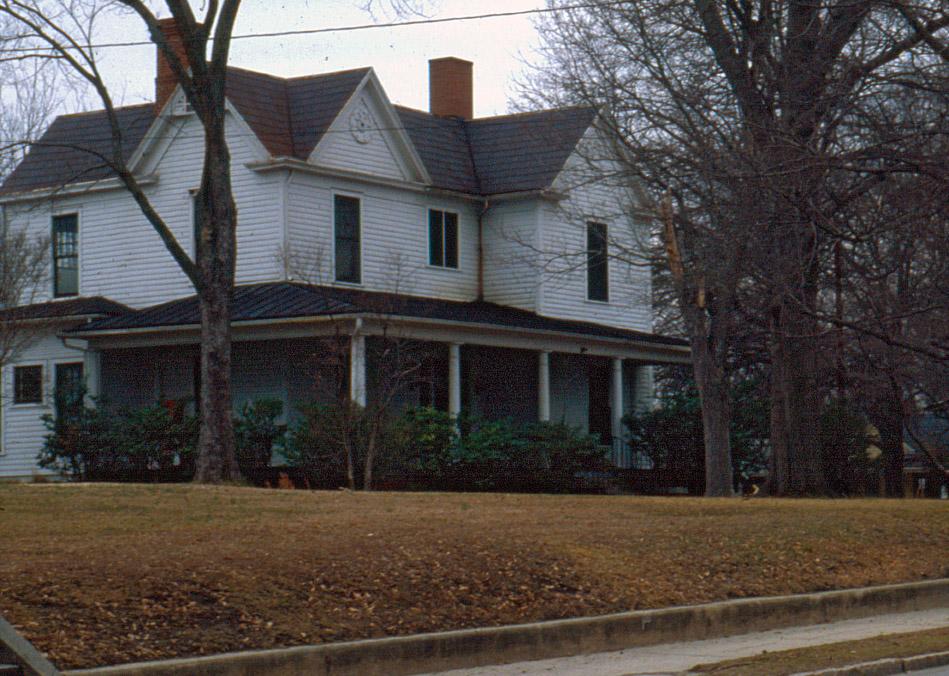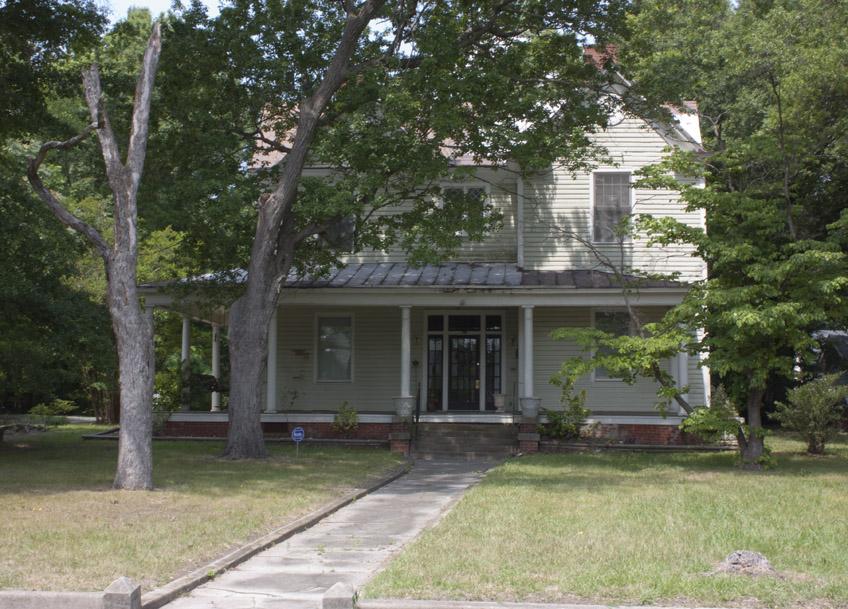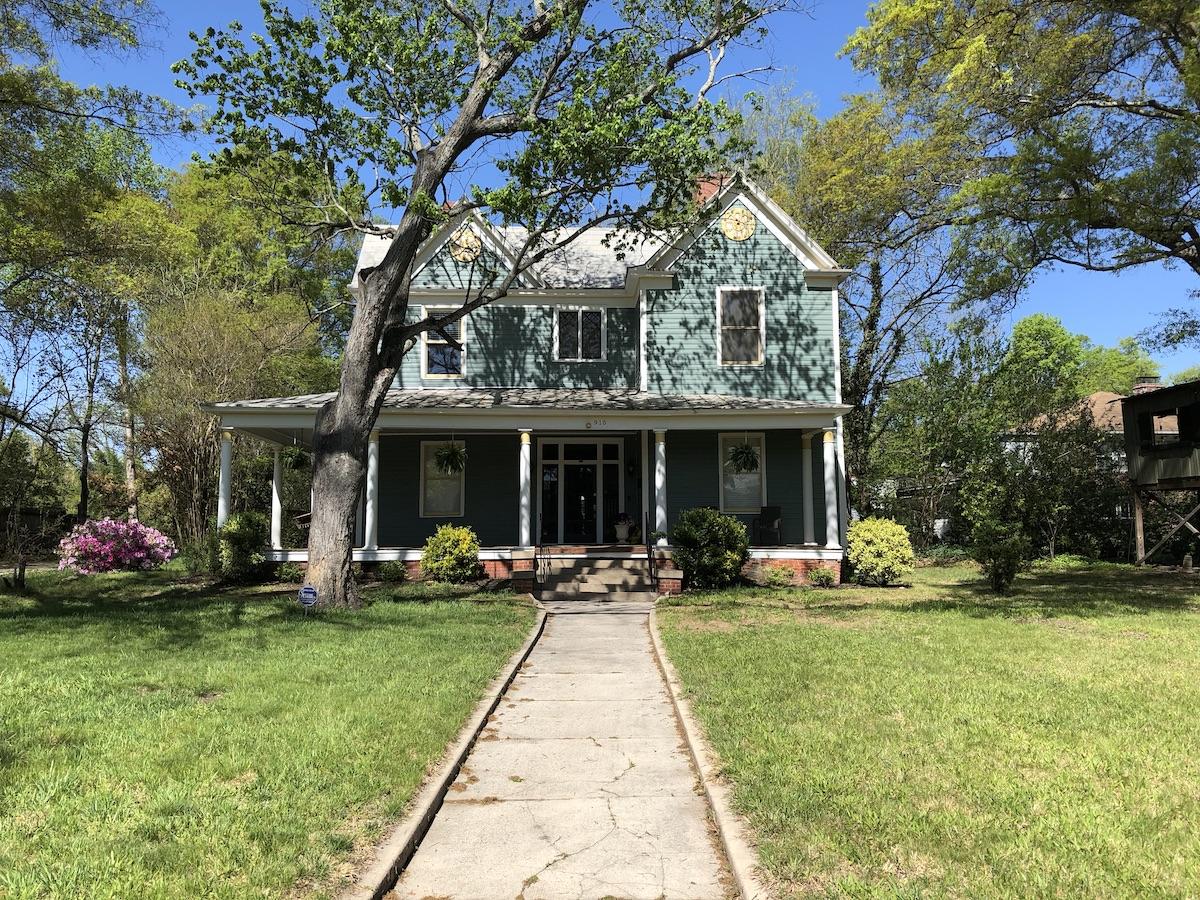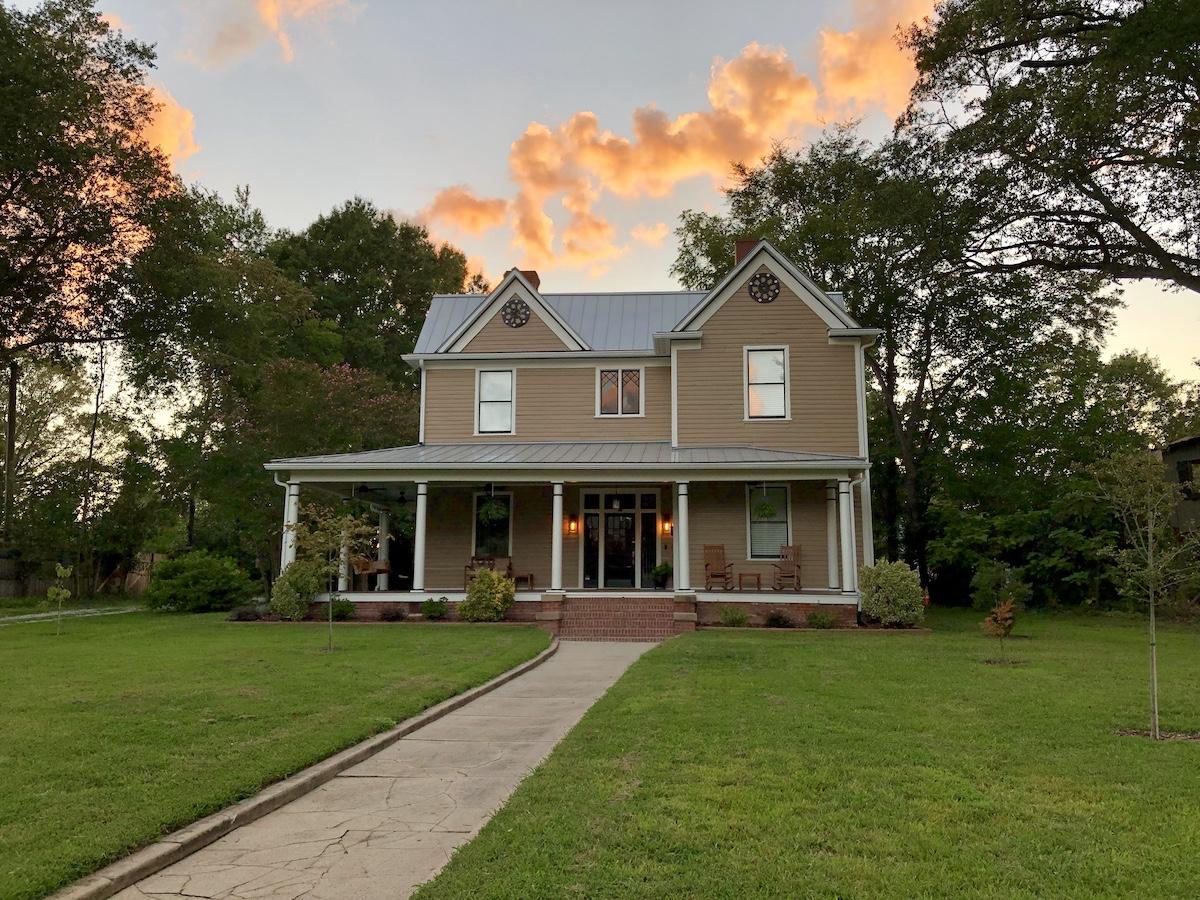1981
From the 1984 National Register listing:
Large two story L-shaped farmhouse style with weatherboard siding. Gable roof topped by two chimneys, one with elaborate brickwork, the other recently rebuilt. Two front facing gables, one closed, one open pediment; both with elaborate round motif within the pediment. Side gable has elaborate barge board. Shed roof veranda supported by round columns.
The house was built in 1898 by William J. Christian, president of the Merchants Bank and former mayor of Durham. William and wife Louisa Gunter Christian lived in the home until 1916. Extended members of the Christian family resided in the home until 1969. In the depression-era 1940s, the home was subdivided into apartments and took on boarders. In 1969, the home was passed down to Ruth Christian Alexander, the niece of Eunice Wynn (William Christian's sister), who lived there with her children until 1990. In 1999, the property was foreclosed on, and Preservation Durham facilitated the sale of the home to new owners in 2000. In 2018, the home was sold to other owners and reconsolidated into a single-family residence.
06-23-08
(The information below in italics is from the Preservation Durham Plaque Application for the William J. and Louisa Christian House)
William Jasper Christian, who constructed 915 N. Mangum in 1898, one of Durham’s most prominent citizens. Born in Durham on December 13, 1839, W.J.’s father, Thomas, was a farmer. The Christian family was a pioneering family, and W.J.’s grandfather came to North Carolina from Virginia in 1790. W.J. was a First Lieutenant in the 6th Infantry of the Confederate Army from 1861-1865. The Sixth Regiment was known as the Orange Grays and was organized by Captain William Johnson Freeland. In 1863, at the battle of Rappahannock, W.J. was captured and held as a prisoner on Johnson’s Island, a POW camp in Ohio, for 18 months.
In 1866, he married Louisa T. Gunter, of Orange County and they settled in Durham. They had six children: Charles E. born in 1867, John E. born in 1869, Thomas B. born in 1872, William Jr. born in 1875, Eunice born in 1881, and Emma Lois in 1882.
W.J. Jr. graduated from Wake Forest College in 1895, and a newspaper announcement reads “A Brilliant Young Graduate…The subject of his graduating thesis was ‘The Economics of Good Roads.’ It is a practical subject and one which should be much more discussed among our people than it is at present.” W.J. Jr. went on to work as the private secretary for General Julian S. Carr.
In 1888, W.J. Sr. helped to form the Blackwell Baptist Church (later Second Baptist Church and now Temple Baptist Church). It grew out of a Sunday school they had started in 1886. Both Louisa and W.J. were active in the church their entire lives.
W.J. was the mayor of Durham from May 8, 1888 to May 6, 1890, and lost reelection in 1890 to M.A. Angier. He ran against Angier in 1892, and a newspaper announcement reads “To the Voters of Durham! I announce to my fellow citizens that I am a candidate for Mayor of Durham at the election to be help the 2d of May, 1892.- W.J. Christian.” He lost to Angier again.
In his 1893 Mayoral run, he ran on what was described as “The Citizens Ticket.” The election appears to be contentious. Several fights ensued, including one between the County Clerk and W.J., “In the election for mayor, Clerk Green took an active part. He went so far as to scratch Jasper Christian’s face when Christian accused him of keeping whisky in his office to influence votes.” Both men were fined. On Election Day, another fight broke out, “Again and again Green with his hat off, cursing most outrageously, sought to beat Christian. Green and his followers were easily restrained, as the sole object of the row was to prevent Christian men from voting in the election…But Christian and his friends stood their grounds, and were not driven from the polls. What an object lesson Democratic methods of election in North Carolina.”
During this period, W.J. supported the populist movement, whose national goals were: unlimited coinage of silver, abolition of national banks, a graduated income tax, election reforms including the election of senators by popular vote and the retune of power to the people in choosing county commissioners, extension of the public school system, more funds to education, and equal rights and equal protection for all. In 1894 the Populists aligned with the Republicans and as a result, Populists entered many local offices. In 1895 they enacted significant legislation based on their national goals. They were less successful in the 1896 election, though W.J. did win his election for the clerk of superior court on a populist message, a position he held for “12 or 14 years”. During the short time the Populists were in power, the Black presence at the polls became politically noticeable. This was enough to install white fear and the Democrats capitalized on this and won overwhelming in future elections. As a result, poll and literacy taxes went into effect.
In about 1898, he constructed his family home at 915 North Mangum, and is shown living there in the 1900 census. In 1916 W.J. deeded the home to (Emma) Lois, and in 1922 (and 1923), she deeded it to her sister Eunice. The 1920 Census lists W.J. Sr. (widowed), Eunice, her husband John, and Lois as living in the home.
W.J.’s ambitions weren’t limited to politics. In 1888, he purchased a mill on the Eno (now called West Point on the Eno), and the mill was called “Christian’s Mill.” By 1909, he sold it to Jim Hopkins and Will Holloway.
In 1909 Mrs. Mangum wrote to her son Hugh Mangum (from Open Durham: https:// www.opendurham.org/buildings/west-point-mill-christians-mill-west-point-eno)
"We had a big rain Friday and the branches and river was out of the banks. Knox Vaughan's corn land was under water yesterday. He had it already to plant. I think he will have to plow it again before he plants it now. Christian has sold the mill to Jim Hopkins and Will Holloway so it is no more Christian's Mill; some way it makes me sad to think about it, but I guess it is for the best for they intend to improve things around there, and Christian would not as long as he could get 30 dollars rent as it was. They gave him forty-five hundred for it. After they bargained for it, another man offered him five thousand, but it was too late. I know it made him sick to lose that five hundred dollars. Durham is still moving out this way; it will get here some day if it keeps on. I don't expect to see it, but some one will if time still lasts.”
In 1899, along with Julian Carr, he formed the Union Furniture Company, which sold “Cheap and Medium Grades of Furniture, Sash, doors, Blinds and all Building Materials.” He served as a “Director who Directs” at The First National Bank of Durham, and later as the president of Merchant’s Bank. He also owned a significant amount of property throughout Durham.
On January 24, 1919, at the age of 73, Louisa T. died. Her cause of death was old age. Her obituary reads, “A mother in Israel has fallen. Mrs. Louise Christian, the beloved wife of William Jasper Christian, president of the Merchants Bank of this city, died this morning at 5 o’clock at her home 915 North Mangum Street, and this announcement carries sorrow to a wide circle of friends.”
About a year later, on May 4, 1920, W.J. Sr. died. His death announcement reads, “William J. Christian, one of Durham’s oldest and most influential citizens, died suddenly Sunday afternoon, about 3 o’clock in Maplewood cemetery, by the side of his wife’s grave, which he was visiting for the first time in several weeks.” He suffered from Kidney disease, and this was ruled his cause of death. Both of his daughters, Lois and Eunice, were with him at Maplewood, when he suddenly died.
The family’s misfortune continued, and the following year, William Jr. died by suicide. He was visiting from out of town, when his body “was found in his room at the hotel shortly after he had slashed his throat with a razor, which was still tightly grasped his his right hand…No reason is assigned for his suicide.”
The 1930 Census lists Eunice, John, and Lois as residing at 915. The 1940 census lists three young women as boarders, and it is possible that it was during this time that the house was subdivided into apartments, as happened to many large houses during the Depression. The house was definitely divided by the 1990s. The 1937 Sanborn Shows two small houses on the rear of the property listed as 915 1/2 and 915 1/3. The division of W.J. Sr.’s estate was contested and a 1934 court case, Woody vs. Christian, went to the North Carolina Supreme Court (page 610 in the attached document). Eunice, John, and Lois continued to reside at 915 until their deaths- John in 1943, Lois in 1966, and Eunice in 1969. All three are buried in the Christian plot at Maplewood cemetery. Neither Eunice and John, nor Lois had any children, and the property was passed to Ruth Christian Alexander, their niece, who then passed it on to her children. They sold the house in 1990.
In 1999, Durham County foreclosed on the property, as well as 923 N. Mangum (also in the Christian Family and on the same deed). Preservation Durham facilitated the sale to new homeowners in 2000, and placed preservation easements on both properties.
In 2019, the house was converted back to a single-family home.
04-20-18
07-28-19





Add new comment
Log in or register to post comments.